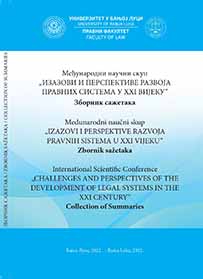THE IMPACT OF THE COVID-19 PANDEMIC ON THE RIGHT TO ACCESS THE INTERNET AS A HUMAN RIGHT
THE IMPACT OF THE COVID-19 PANDEMIC ON THE RIGHT TO ACCESS THE INTERNET AS A HUMAN RIGHT
Author(s): Jelica GordanićSubject(s): Law, Constitution, Jurisprudence, Civil Law, International Law, Human Rights and Humanitarian Law, Health and medicine and law, ICT Information and Communications Technologies
Published by: Правни факултет Универзитета у Бањој Луци
Keywords: internet; human rights; legal access to the internet; Covid-19; the United Nations, digital divide;
Summary/Abstract: The Covid-19 pandemic changed the functioning of states, international organizations and brought enormous changes to people’s daily lives. During the pandemic, the realization of many human rights, such as the right to education, the right to work, the right to freedom of expression and access to information, was only possible through internet. In the period before the Covid-19 pandemic, there were certain acts and initiatives that define the right to access the internet as a human right. Estonia, Finland, France, Costa Rica, Mexico, Spain and Greece are among countries that recognized the right to access the internet as a basic human right through various mechanisms- constitution, laws, and court decisions. The United Nations adopted non-binding resolutions in 2016 and 2021 defining the right to access the internet as a human right. The paper examines whether the Covid-19 pandemic can influence the right to access the internet in order to become a globally accepted human right. The pandemic has shown that the access to the internet is necessary for the realization of large number of other rights. In addition, the pandemic period highlighted the so-called digital divide, that is, the gap between those who have and those who do not have the internet access. The obstacles that stand in the way of the right to access the internet becoming human right are also discussed. The author emphasizes the lack of economic resources and the absence of political will of a large number of countries as the most complex obstacles. The list of human rights is subject to change and expansion. The paper concludes that the pandemic indicated the necessity of the internet and opened numerous questions regarding the further development of the right to access the internet as a human right. Bearing in mind the previous properties of the internet as a means of social criticism, the resistance and lack of interest of states can be expected as the biggest obstacles on the way to the right to access the internet to be recognized as human right.
Journal: Зборник радова Међународни научни скуп „Изазови и перспективе развоја правних система у XXI вијеку"
- Issue Year: 2022
- Issue No: 2
- Page Range: 169-184
- Page Count: 16
- Language: English

